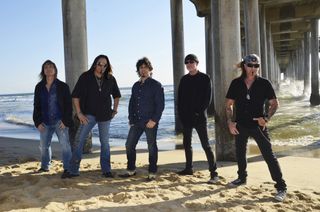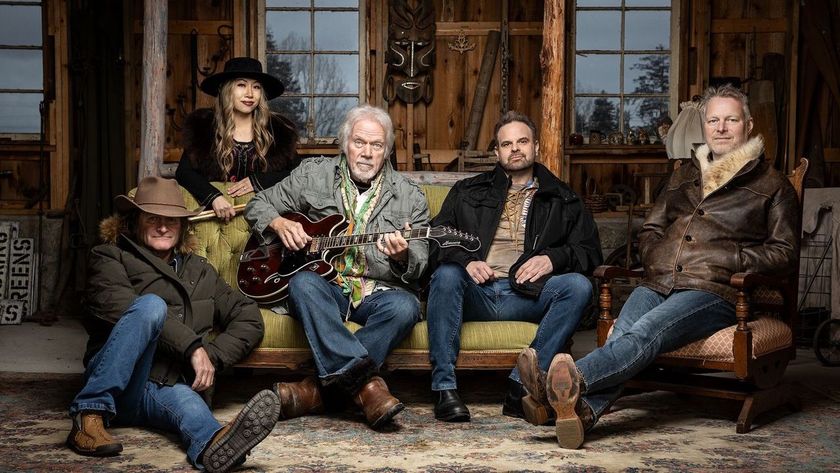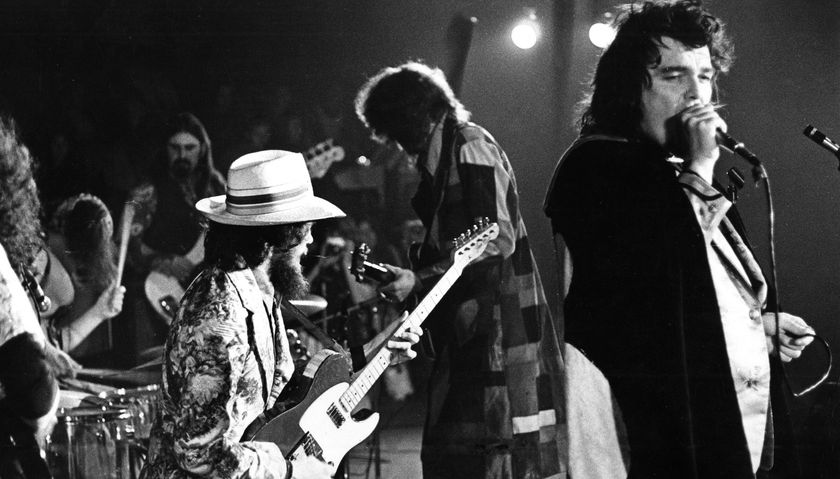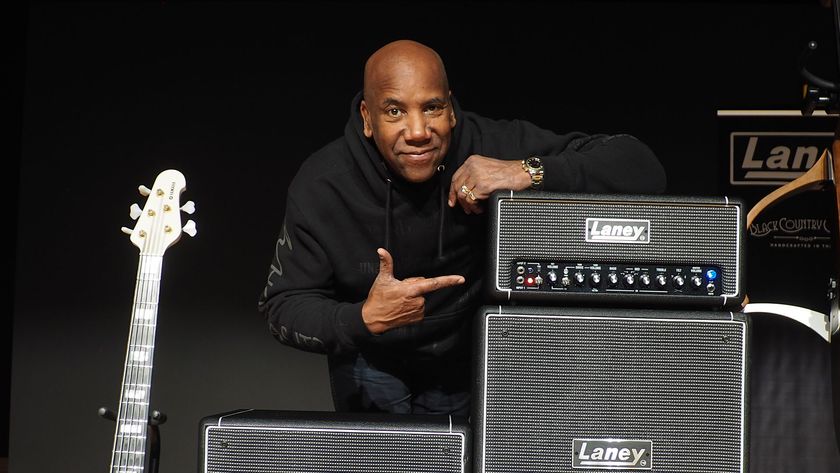Interview: Mark Kendall Discusses 30 Years of Great White and New Live Album

Great White were among the last hard rock acts to hit it big in the Eighties, just before grunge changed the sound and direction of popular music.
Emerging from the Hollywood club scene, they had their commercial breakthrough with 1987’s Once Bitten album, then scored their biggest hit with their 1989 version of the Ian Hunter song “Once Bitten, Twice Shy.”
That proved to be the peak of the group’s popularity. As their fame faded in the Nineties, Great White endured their share of adversity, including breakups, an ongoing dispute with founding lead singer Jack Russell over use of the band’s name, and the Station nightclub fire in 2003 that claimed 100 lives.
But Great White have been nothing if not tenacious. Over the past 10 years, they have continued to perform with a variety of lineups and released two studio albums, 2009’s Rising and last year’s Elation.
Now, to celebrate their 30th anniversary, Great White have gone back to their Hollywood roots to make 30 Years: Live from the Sunset Strip, a new live album recorded on the hallowed ground where Great White and bands like the Doors and Van Halen cut their teeth. The record features the latest lineup of founding lead guitarist Mark Kendall, singer Terry Ilous, guitarist/keyboardist Michael Lardie, bassist Scott Snyder and drummer Audie Desbrow.
Guitar World caught up with Kendall, who spoke about the new live album, the band’s continuing dispute with Jack Russell, the Station fire and much more.
GUITAR WORLD: What was the impetus behind returning to the Sunset Strip for the new 30th anniversary album?
Get The Pick Newsletter
All the latest guitar news, interviews, lessons, reviews, deals and more, direct to your inbox!
We thought it would be fun to bring it back to where it all started—grinding it out in the clubs in Hollywood. The place where we played was called Gazzarri’s, a club that Van Halen used to play four nights a week. They’ve since rebuilt it and changed the name of it to the Key Club. We invited a lot of friends and fans, and brought cameras down to record it. There were people there we haven’t seen in a long time, some of whom have been with us from the very beginning. It was fun.
What are some of your best memories of the band’s past 30 years?
There are a lot of good things. One that stands out was when we played the Forum. When you’re a teenager in a band, you always dream about playing there, because that’s where Zeppelin and the other big bands used to play. When we finally played there, it was special because my parents were there, along with many people who I went to school with. It was also the night the record company came onstage to present us with our double-Platinum records [for …Twice Shy].
”Rock Me” [from Once Bitten…] was the group’s breakout hit. What do you think makes that track so special?
The real magic of that song is the fact that a lot of my blues influences showed up on it. As a teenager, I was really into those “feel” kind of players, like Billy Gibbons, Ritchie Blackmore and Carlos Santana. I like players who play from the heart and the pores of their skin. The more songs we wrote, the more those blues overtones started to come through. “Rock Me” was the first song that had that. It was a defining moment for the band, and a song I could tell was going to be special.
How was the decision made to cover Ian Hunter’s “Once Bitten, Twice Shy”?>
Our manager came to us with that song. We played and recorded it, never figuring they’d make it the first single from …Twice Shy. But the record company insisted that it was the “big song,” and sure enough, it was a big hit. That song went on for so long. It was even Number One on MTV. As a result, we did long tours with a lot of great bands, like Scorpions, Judas Priest and Iron Maiden, and we learned a lot from them. It was an exciting time.
Jack Russell had been touring as a solo act when he asked you to play some dates with him as Jack Russell’s Great White in 2002. It was during that tour that the Station nightclub tragedy occurred. Can you take us through the events leading up to that?
Jack was out doing a solo tour, and I was doing my own solo thing. His material was so far removed from Great White that I got a call from his management asking me to come out and perform so he could do some more Great White material and include songs from his solo record. He could also then change the billing from “Jack Russell” to “Jack Russell’s Great White” because I would be with him.
At one of the early shows, they fired up this sparkler thing [a pyrotechnic gerb, a device that releases a jet of sparks], and I was concerned because the places we were playing were pretty small. I remember at one point seeing Jack standing right in the middle of them. I asked him if it hurt, and he said they didn’t; they were just cold sparks.
That night [at the Station] after they had gone off, I felt heat on my back and immediately knew that something wasn’t right. I turned around and noticed that a small area of the foam behind my amp had caught fire. We later would find out that the foam they had used on the walls of the building was very flammable, and they shouldn’t have allowed the pyrotechnics. But once they opened up the doors [to evacuate the venue], the place went up like a matchbook.
After it was all over, I came home and didn’t know what to do. I was counseling with people, and my pastor and I were talking every day and praying. After a few months, we heard that there was a way we could help, and that’s when I got in touch with the Station Family Fund people and the whole relationship started. [Great White began a benefit tour for the Fund that ran from July 2003 until 2005.]
It’s been 10 years now, and I think the best part of the healing process for everyone has been the fellowship — the love and hugs and sticking together. It helps us all get through it. When these anniversaries come around, it’s a tough thing, so we try to stay close.
[Former Warrant vocalist] Jani Lane sang with the band for a while. What was it like working with him?
Jani was always prepared and professional, and I was in close contact with him. I really want people to know that before he died, he and I would have long conversations and he’d say to me, “People don’t realize but I want to be sober more than anything. More than anything!” [Lane died in 2011 of acute alcohol poisoning.] Unfortunately, the demons just kind of overcame him. When he was busy and touring with us, it really validated him. But it was when he was at home and not doing anything, that’s when the alcohol lights went off in his head, and he couldn’t control them.
I went to his memorial because I wanted people to know that he cared about his family and really wanted to be a sober man. The thing is, you never know what’s going to happen or what may be that fatal blow. That’s why if you’re someone with a substance problem, you really need to identify and get out of it.
Now that you’re an elder statesman of rock, what’s the biggest piece of advice you can give?
Never give up on your dream. Find out who the best bands are and why they’re the best at what they do. In my era, that band was Van Halen, and one of the reasons they were so good and so popular was because they played more than anyone. Every time a major act came through, whether it was UFO, Santana — no matter who it was, Van Halen was the opening act. And they not only played originals but covers, as well. Because of that, they were always playing and became super tight.
Also, get your name out there. It takes a lot of work, but today you have the Internet, which is something we didn’t have, so use that to your advantage. We did it the old-school way, by going out with a staple gun and posting on telephone poles. Even if you have to play for free sometimes, if it means people are going to be standing in front of the stage, go play! Get your name out there and get people used to seeing it everywhere.
When I got together with my singer, we would sometimes even pretend that we were doing interviews. We’d literally sit down with a cassette player and ask each other questions, pretending like we were playing the Forum — actually envisioning it. We really believed that one day all of these things would happen. And everything did.
30 Years: Live from the Sunset Strip will be released February 26. For more information on Great White, including tour dates and more, check out greatwhiterocks.com and Facebook.
James Wood is a writer, musician and self-proclaimed metalhead who maintains his own website, GoJimmyGo.net. His articles and interviews are written on a variety of topics with passion and humor. You can follow him on Twitter @JimEWood.




James is a guitarist and freelance writer who's interviewed some of the biggest names in music. He is the author of four books and his writing credits include work for Guitar World, AXS and Yahoo! as well as for his hometown newspaper where he writes on a variety of topics with both passion and humor. As a guitarist, he's performed everywhere from local bars and nightclubs to some of the biggest stages in front of thousands of music fans.

"The BTO sound is BACK!!" Bachman-Turner Overdrive release first new material in over 25 years – and it features a Neil Young guitar solo

“He would beat the crap out of the guitar. The result can best be described as Jackson Pollock trying to play like John Lee Hooker”: Aggressively bizarre, Captain Beefheart's Trout Mask Replica remains one of the craziest guitar-driven albums ever made









